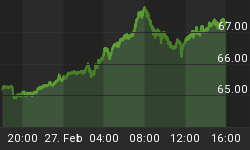Investors are valuing companies based on what are likely to be "normalized" earnings for 2011. This method could be as risky as when investors valued internet and technology companies based on EBITDA in the late 1990s. The forward PE multiple on the S&P 500 currently matches that at the beginning stage of the technology bubble (see Figure 1). We believe that it is unlikely for there to be normalized earnings for the following reasons.
-
Investors and analysts are assuming that normalized earnings mean a return to the 2005-2007 US economic model. However, that time period was driven by a consumer spending and housing bubble, which was not a "normal" economy.
-
Low US interest rates and high budget deficits are clearly hurting the US Dollar and, as a consequence, oil has risen steadily to a new 52-week high just above $80 a barrel. Higher costs for food and energy will eventually stifle any recovery since consumer spending accounts for 70% of the US economy.
-
If the US economy recovers, interest rates will be forced higher. Although a recovering economy will lead to lower loan loss provision expenses at banks, the market may be overlooking the impact that higher deposit costs will have on bank profitability.
-
Rising interest rates could lead to another downturn in housing prices.
-
The consumer psyche has been damaged. The severe wealth destruction of the past two years will have a lasting effect. America's baby boomers led the spending binge of the 1990s. However, today baby boomers are forced to save more as they near retirement.
-
Increased government interference and regulation are a stark contrast from the laissez faire environment of the mid 2000s. Thus, the earnings power of the US economy is likely to be lower in the period ahead.
-
The US Dollar and the Federal Reserve have lost credibility. During the 1990s and mid 2000s, both Alan Greenspan (then known as the Maestro) and the Federal Reserve were revered by investors and other central banks around the world. That is not the case today. The Federal Reserve is under attack by Congress by way of an "audit the Fed" bill, while both open and closed door discussions on the Dollar's viability are taking place among our trading partners. The fragile US Dollar is not the solid foundation necessary for normalized earnings to be achieved.
-
Tax rates in the US will likely increase at the individual and corporate level to pay for the bailouts and stimulus packages.
Figure 1















